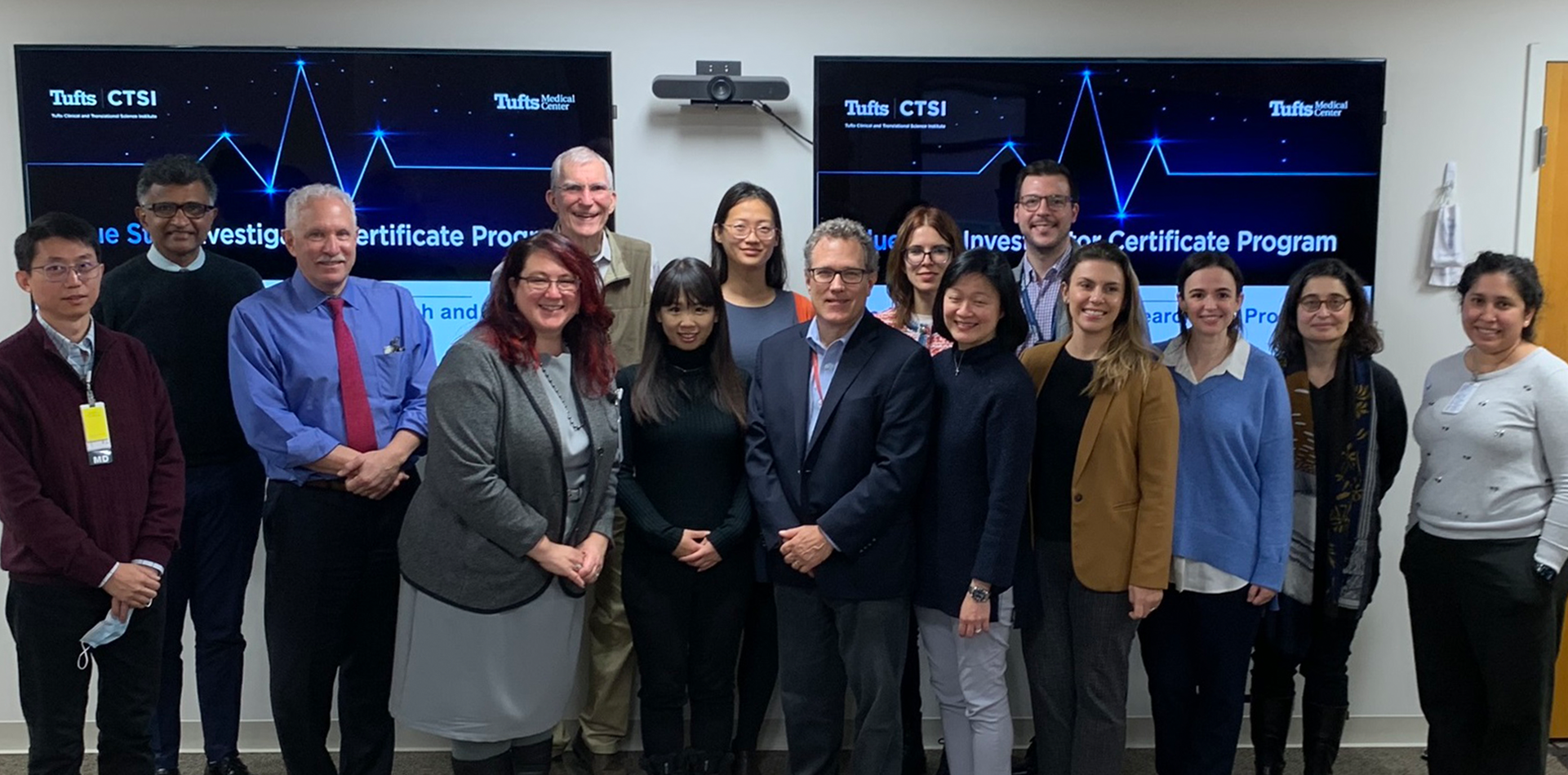Scientific Peer Review
All complete LOIs and applications will be peer-reviewed by at least two reviewers with relevant expertise. The reviewers will be primarily selected from the pool of Tufts CTSI Scientific Review Committee members, which includes past Tufts CTSI award recipients. They may also include reviewers from Tufts CTSI partner organizations and Clinical and Translational Science Awards (CTSA) External Reviewer Consortium (CEREC) II, of which Tufts CTSI is a part. The review process will follow NIH guidelines for peer review using the criteria listed below.
Significance – ability to produce cross-cutting solutions across multiple diseases, treatments, and interventions while also addressing unmet scientific, patient or population health needs.
- Does the project address translational research challenges and solutions by seeking commonalities across a range of diseases, conditions, treatments, or interventions?
- Does the project identify, develop and/or test solutions to common translational research roadblocks?
- Does the project advance translational research to develop solutions for unmet patient and population health needs? In particular, does it address existing health inequities?
- Do the expected project results have a high likelihood of being successfully disseminated beyond publications and presentations as well as, if applicable, adopted and implemented in a range of academic and clinical practice settings?
Innovation – focus on increasing the impact of research through translational science innovations in research methods, processes, and structures.
- Does the project pose an innovative question that can help identify generalizable principles and scalable solutions?
- If the aims of the project are achieved, will they result in the development and subsequent adaptation and implementation of innovations in research methods, technologies, and approaches that increase the impact of translational research?
- Does the project develop and implement innovations in teamwork, partnerships, methods, and/or operations that enhance the quality, efficiency, and/or impact of translational research?
- Does the project have a real-world application?
Approach – ability to develop research questions and implement transformative approaches that match the complexity of the translational problem being addressed.
- Are the overall strategy, methodology, and analyses well-reasoned and appropriate to accomplish the specific aims of the project? If applicable, is a statistical and power analysis plan clearly articulated?
- Does the project successfully integrate the range of disciplines and fields that can contribute to advancing the research goals?
- Does the project successfully leverage patient and/or community engagement to advance translation in the conceptualization, implementation, interpretation, and/or dissemination of study findings?
- For projects that involve secondary research of already existing data, are the data readily available and sufficiently robust to support the proposed research?
- For projects involving human participants, does the project include participants with characteristics to ensure that the knowledge gained can be broadly applied across a range of diseases and conditions?
- Are potential problems, alternative strategies, and benchmarks for success presented?
- Will the project advance translational science regardless of whether the initial research objective is met (e.g., learning from failures)?
- As proposed, is the project feasible? Can the specific aims be successfully accomplished during the award’s one-year time frame and within the proposed budget?
Team and Organizational Environment – ability to effectively engage stakeholders, leverage cross-disciplinary team science, and build effective boundary-crossing partnerships.
- Do key personnel and principal investigators, in particular, have the sufficient expertise and relevant experience to undertake and lead the project?
- Are stakeholders with relevant experience and expertise across disciplines, fields, and professions appropriately engaged?
- Does the project implement evidence-informed practices for team-based science and patient and/or community engagement? Will it benefit from unique features of the scientific environment, participant populations, and/or collaborative arrangements?
- Does the project include personnel with all the necessary technical skills? For projects focused on analyzing data in an existing database, in particular, does the project team include individuals with sufficient level of familiarity in how data in the database were generated and how variables of interest are represented?
- Are the necessary resources available to facilitate cross-disciplinary teaming and patient and/or community engagement to advance the science?
- Are the project management and organizational strategies clear (e.g., team structure, inclusive communication practices, work tasks coordination, decision-making process)?
Future Plans – clear articulation of the generalizability of the effort (any next steps would be next steps for the field, not the investigator).
- Does the proposal outline specific steps for publication of results in the peer-reviewed literature if the pilot project is successful and a plan for reporting negative results if it is not successful?
- Beyond publications and presentations, does the proposal outline a clear plan for how additional dissemination and/or implementation efforts will be undertaken and supported?
- Does the proposal outline specific steps for communicating research results to study participants and other relevant stakeholders?
- Does the proposal describe how stakeholders will be engaged in determining the project’s future trajectory, including its overall dissemination and implementation strategy?
- Does the proposal outline specific steps for acquiring external funding and other resources needed to support the stated future objectives of the project?
- Does the proposal identify barriers that could undermine future dissemination and implementation efforts? If so, are strategies to address them appropriately considered?
Stakeholder Engagement and Dissemination Plan Review
Regardless of the selected translational phase, all proposals must include a stakeholder engagement and dissemination plan which will be reviewed separately by at least two members of the Tufts CTSI Stakeholder Expert Panel. The panel comprises community members with diverse professional and cultural backgrounds who will evaluate the applicants’ ability to identify relevant stakeholders, engage these stakeholders in the research project and the subsequent dissemination and implementation efforts, and articulate relevance of project outcomes to the identified stakeholder groups and the public based on the criteria below.
Stakeholders – ability to identify key stakeholder groups and determine the role they play or may play in the proposed research project or dissemination of its results.
- Are key stakeholder groups directly and/or indirectly affected by or that affect the proposed research project clearly defined and described? Do they include stakeholders who could inform the dissemination and implementation strategy as well as participate in its real-world execution?
- Does the plan provide a compelling rationale for engaging identified stakeholders in the proposed research project and dissemination of its results and/or future implementations of interventions or programs?
- Does the plan describe involvement of historically underrepresented stakeholder groups, including but not limited to those from underserved, under-resourced, marginalized, and/or hard-to-reach communities?
- If applicable, does the plan describe how the identified stakeholder groups have been involved in the conceptualization of the proposed project and development of research procedures (e.g., defining or refining research question(s), designing research protocol(s), identifying research participants, and communicating research results)?
- Is the existing or proposed involvement of the identified stakeholder groups described adequately to assess the role(s) these groups currently play or will play in the project?
Relevance – ability to demonstrate explicit relevance of the project and its outcomes to the identified stakeholder groups and the public.
- Does the plan provide a clear statement of the project’s specific relevance to the identified stakeholder groups? Is the statement supported by compelling and logical reasoning?
- Does the plan describe the value and impact of the proposed research project to the identified stakeholder groups and/or specific populations?
- Does the plan explain how the identified stakeholder groups and/or specific populations will benefit from research outcomes? If so, does the plan specify what the applicant will do to ensure that there is appropriate follow-up?
- If the aims of the project are achieved, how likely is it that the project’s outcomes and results will be successfully disseminated beyond publications and presentations and/or applied (e.g., implemented into clinical practice, used to advance translational science or to inform health policy, applied in the form of new interventions, treatments, or devices)?
Approach – rigor of the proposed stakeholder engagement plan to meet the proposed objectives and goals.
- Does the plan support the overall objectives of the proposed research project?
- Does the plan describe how the knowledge, experience, and expertise of the identified stakeholders will be practically applied in the implementation of the proposed research project? If traditionally underrepresented stakeholder groups are involved, does the proposed approach demonstrate their intentional involvement and meaningful engagement?
- Does the plan describe how the stakeholders will be engaged to identify factors that could affect future dissemination and implementation of the project’s outcomes and results?
- Does the proposed engagement strategy foster solid, bidirectional relationships that promote collaboration and an atmosphere of mutual trust and understanding?
- Is the proposed communication strategy adequate and tailored to meet the specific needs of each partnership with the identified stakeholder groups?
- As proposed, is the plan realistic? Does it have a high likelihood of being successfully implemented during the award’s one-year timeframe and within the proposed budget? If circumstances were to change, is the plan sufficiently flexible to allow for modifications?
Funding Decision and Announcement
Final funding decisions will be made by the Tufts CTSI Senior Leadership Team based on recommendations of the Scientific Review Committee with input of Stakeholder Expert Panel. Key funding considerations include the overall impact score, project feasibility, clear strategy and intentional focus on health equity, budget justification, available funds, and distribution across the translational spectrum. A minimum of four and a maximum of six research projects will be funded. The final number of awards will be dependent on the volume of meritorious applications received and their individual budget requirements. All applicants will be informed of the outcome of their submission via email. Reviewers’ comments will be provided to all primary applicants, regardless of whether or not they are awarded funding.
Research Collaboration Team Review
In addition to review by the S-GATS Program Scientific Review Committee and Tufts CTSI Program Leaders, applications may be reviewed by the Tufts CTSI Research Collaboration Team to identify projects for further development and submission to other funding announcements, and/or to identify potential collaborators. Applicants may be contacted by Tufts CTSI Navigators or other members of the Research Collaboration Team for future research opportunities.
Confidentiality and Non-Disclosure
All applications will be deemed proprietary and confidential and will be protected against any unauthorized use and any unauthorized or uncontrolled disclosure beyond Tufts CTSI and the 2024 S-GATS review committees.
Questions?
We are here to help. Please contact us at sgats@tuftsmedicine.org.



